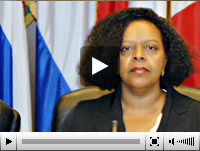- English
Cátedra de las Américas
Twenty Fourth Lecture - Matilde Ribeiro
Twenty Fourth Lecture - December 4, 2007
“Combating racism and discrimination: A Policy of Inclusion”
Orador: Matilde Ribeiro, Brazil’s Special Secretary for the Promotion of Racial Equality Policies.
I am very pleased at the opportunity to address you in my capacity as Minister of the Special Secretariat for Policies for Promotion of Racial Equality in Brazil, which directly advises the President of the Republic on matters concerning the protection of the human rights of ethnic and racial groups traditionally subjected to racism and discrimination in Brazil, with a focus on the black population.
Brazil recognizes the persistence of racism and its devastating consequences for the lives of millions of Brazilians. This cruel form of discrimination continues to arise, especially affecting persons of African and indigenous descent and impairing their enjoyment of the legal and material equality that is theirs by right. In our view, overcoming this reality and the just promotion of equality are necessary for the full consolidation of democracy in our country. There will be no effective democracy in Brazil, or in any other nation, until the wounds of racism, xenophobia, and all forms of intolerance have been truly healed.
It was in response to a historic demand from the social movements that the Brazilian Government revisited the mistaken notion that racial democracy in Brazil might exist and assumed responsibility for overcoming the inequality and denial of opportunity that still divide our society. The adoption of government policies to that effect began to be promoted consistently with the establishment of the Special Secretariat for Policies for Promotion of Racial Equality (SEPPIR), with strong support from civil society organizations. Since then, measures to ensure racial equality based on principles of transversalism, decentralization, and democratic action have become stronger.
Transversalism has to do with efforts to include the racial equality perspective in the initiatives of various areas of the Brazilian Government, whether in economic affairs, health promotion, education, culture, justice, etc. Partnership with other public administration agencies allows the Secretariat to promote the identification of specific demands of disadvantaged ethnic and racial groups, seeking solutions together with the competent body. In many situations, then, it is a question not of formulating, planning, and executing specific new policies for such groups but of taking a different approach to meeting their needs under existing policies.
Decentralization refers to the incorporation of racial equality policy into the activities of states, municipalities, and the Federal District. As provided in the Brazilian Constitution, Brazil is a federative republic; therefore each federated body is responsible for providing certain public goods to the population. The decentralization of policy, therefore, is aimed at making it possible to fully serve the marginalized populations in the specific areas of competence of those federated bodies.

